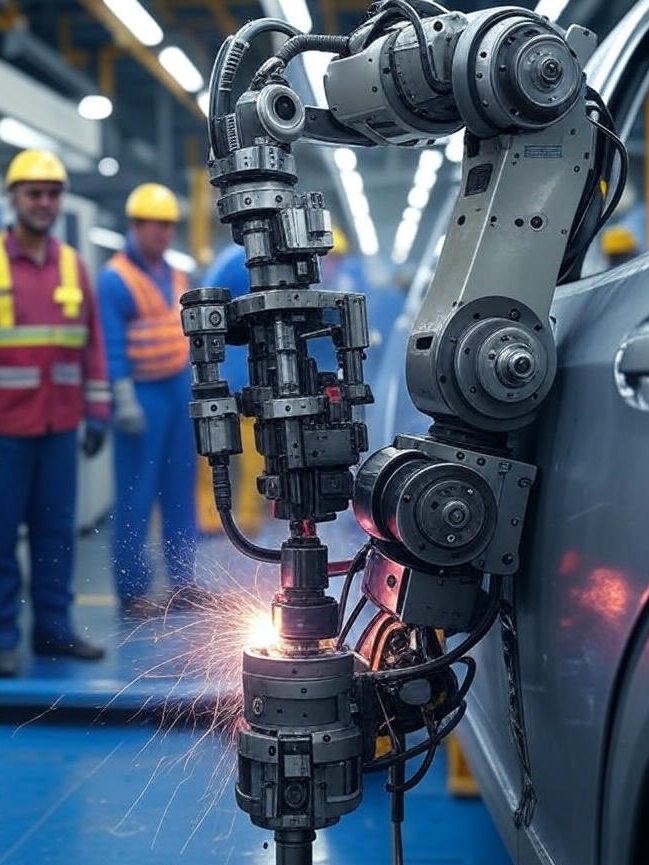
Introduction
The automotive industry, a cornerstone of modern engineering, is undergoing a seismic transformation. Artificial Intelligence (AI) is no longer a futuristic concept but a driving force reshaping car manufacturing. From optimizing factory floors to embedding intelligent features in vehicles, AI is revolutionizing every facet of the industry. This blog explores how AI is transforming car manufacturing, delivering efficiency, innovation, and a new era of smart mobility.
1. AI-Powered Factory Floors: Redefining Efficiency
Streamlined Production Lines
AI is transforming traditional assembly lines into intelligent, adaptive systems. Machine learning algorithms analyze real-time data from sensors to optimize workflows, reduce downtime, and minimize waste. For instance, predictive maintenance powered by AI detects equipment failures before they occur, saving manufacturers millions annually.
Robotics and Automation
Collaborative robots, or “cobots,” work alongside human workers, guided by AI to perform precise tasks like welding or assembly. Companies like Tesla and BMW use AI-driven robotics to enhance speed and accuracy, boosting production rates by up to 20% in some cases.
Quality Control
AI vision systems inspect components with unmatched precision. Deep learning models identify defects in real-time, ensuring only flawless parts reach the assembly line. This reduces recall costs and enhances brand reliability.
2. Supply Chain Optimization: AI at the Helm
Demand Forecasting
AI algorithms predict market demand by analyzing trends, consumer behavior, and economic indicators. This allows manufacturers to adjust production schedules and inventory, avoiding overstock or shortages.
Logistics and Delivery
AI optimizes supply chain logistics by calculating the fastest, most cost-effective routes for raw materials and finished vehicles. Real-time tracking ensures transparency, while AI mitigates disruptions like port delays or weather events.
Sustainable Sourcing
AI helps manufacturers source eco-friendly materials by analyzing supplier data and environmental impact. This aligns with consumer demand for sustainable vehicles and stricter regulatory standards.
3. Design and Prototyping: AI as the Creative Partner
Generative Design
AI-powered generative design tools create thousands of vehicle design variations based on parameters like weight, aerodynamics, and safety. Engineers select the best designs, accelerating innovation and reducing development time.
Virtual Prototyping
AI-driven simulations test vehicle performance in virtual environments, eliminating the need for costly physical prototypes. This speeds up the design process and allows for rapid iteration.
Personalization
AI enables mass customization by analyzing customer preferences. Buyers can configure vehicles with tailored features, from interior finishes to tech packages, creating a unique driving experience.
4. AI in Vehicle Features: The Rise of Smart Cars
Autonomous Driving
AI is the backbone of self-driving technology. Neural networks process data from cameras, LIDAR, and radar to navigate roads, avoid obstacles, and make real-time decisions. Companies like Waymo and Tesla are pushing Level 4 and 5 autonomy, promising safer roads and reduced human error.
Advanced Driver Assistance Systems (ADAS)
AI enhances ADAS features like lane-keeping, adaptive cruise control, and automatic braking. These systems rely on machine learning to adapt to driving conditions, improving safety and comfort.
In-Car Personalization
AI-powered infotainment systems learn driver preferences, adjusting settings like climate control, music, and navigation routes. Voice assistants, like those developed by Amazon and Google, offer seamless interaction, making cars an extension of the driver’s digital life.
5. Sustainability: AI’s Role in Green Manufacturing
Energy Efficiency
AI optimizes energy consumption in factories by controlling lighting, heating, and machinery. This reduces carbon footprints and operational costs, aligning with global sustainability goals.
Battery Production for EVs
AI improves electric vehicle (EV) battery manufacturing by predicting material performance and optimizing production processes. This lowers costs and extends battery life, making EVs more accessible.
Circular Economy
AI supports recycling by identifying reusable materials in end-of-life vehicles. Machine learning models sort components, reducing landfill waste and promoting a circular economy.
6. Workforce Transformation: Humans and AI in Harmony
Upskilling the Workforce
AI necessitates new skills, prompting manufacturers to invest in training programs. Workers learn to operate AI tools, program robots, and analyze data, creating higher-value roles.
Enhanced Safety
AI monitors factory conditions, detecting hazards like gas leaks or ergonomic risks. Wearable devices with AI alert workers to potential dangers, reducing workplace injuries.
Human-AI Collaboration
AI augments human capabilities rather than replacing them. Workers focus on creative and strategic tasks, while AI handles repetitive ones, fostering a balanced workforce.
7. Challenges and Ethical Considerations
Data Privacy
AI relies on vast datasets, raising concerns about consumer privacy. Manufacturers must ensure secure handling of driver and vehicle data to maintain trust.
Job Displacement
While AI creates new roles, it may displace low-skill jobs. Companies must manage transitions through reskilling and support programs to minimize social impact.
Ethical AI in Autonomous Vehicles
Self-driving cars face ethical dilemmas, like decision-making in unavoidable accidents. Industry standards and regulations are evolving to address these complex issues.
8. The Future of AI in Car Manufacturing
Hyper-Personalized Vehicles
AI will enable fully customized cars produced at scale, blending consumer preferences with sustainable materials and advanced tech.
AI-Driven Factories
Smart factories will operate autonomously, with AI managing every aspect from design to delivery, achieving unprecedented efficiency.
Mobility as a Service (MaaS)
AI will power shared mobility platforms, integrating autonomous fleets with public transport. This will redefine car ownership and urban planning.
Conclusion
AI is not just reshaping car manufacturing; it’s redefining mobility itself. From smarter factories to feature-rich vehicles, AI drives efficiency, sustainability, and innovation. As the industry accelerates toward an autonomous, eco-friendly future, AI stands as both the engine and the navigator. The road ahead is exciting, and AI is firmly in the driver’s seat.
Call to Action
What do you think about AI’s role in car manufacturing? Share your thoughts in the comments below or connect with us on social media to join the conversation. Stay tuned for more insights on how technology is shaping the future!










